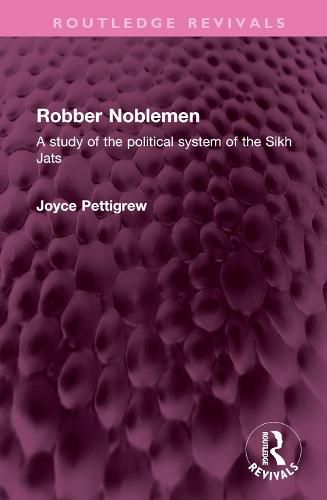Readings Newsletter
Become a Readings Member to make your shopping experience even easier.
Sign in or sign up for free!
You’re not far away from qualifying for FREE standard shipping within Australia
You’ve qualified for FREE standard shipping within Australia
The cart is loading…






First published in 1975, Robber Noblemen represents a break with traditional anthropological studies within the Indian subcontinent in the breadth of its coverage. A whole state, the Punjab, is discussed, with special reference to the social and political organization of its landowning Sikhs: the Jats. Joyce Pettigrew demonstrates that although the Punjab is included within the formal political framework of the Indian Union, it is nevertheless more closely allied to countries on its western border, by virtual of its social structure and value system. The caste system does not exist among the Sikhs. Values sustaining patterns of social and political action are not those pertaining to ritual purity and pollution but are those concerned with the extended family unit: honour, reputation, insult. The author shows how long-standing collaborative relationships between families compete with other similarly formed alliances or 'factions' for power and influence. This book will be of interest to students of anthropology, history, political science and South Asian studies.
$9.00 standard shipping within Australia
FREE standard shipping within Australia for orders over $100.00
Express & International shipping calculated at checkout
First published in 1975, Robber Noblemen represents a break with traditional anthropological studies within the Indian subcontinent in the breadth of its coverage. A whole state, the Punjab, is discussed, with special reference to the social and political organization of its landowning Sikhs: the Jats. Joyce Pettigrew demonstrates that although the Punjab is included within the formal political framework of the Indian Union, it is nevertheless more closely allied to countries on its western border, by virtual of its social structure and value system. The caste system does not exist among the Sikhs. Values sustaining patterns of social and political action are not those pertaining to ritual purity and pollution but are those concerned with the extended family unit: honour, reputation, insult. The author shows how long-standing collaborative relationships between families compete with other similarly formed alliances or 'factions' for power and influence. This book will be of interest to students of anthropology, history, political science and South Asian studies.